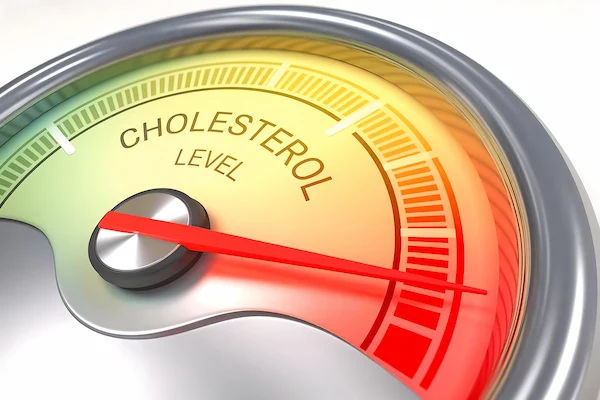Ways To Lower Ldl Cholesterol Without Medication
Discover effective ways to lower LDL cholesterol naturally without medication. Learn heart-healthy diets, lifestyle changes, exercise tips, and supplements to improve your cholesterol levels safely.

Written by Dr. Rohinipriyanka Pondugula
Reviewed by Dr. M L Ezhilarasan MBBS
Last updated on 13th Jan, 2026

Introduction
High LDL cholesterol, often dubbed the "bad" cholesterol, is a silent threat lurking in the bloodstream of millions. It's a major contributor to plaque buildup in arteries, increasing the risk of heart attack and stroke. While medications like statins are effective, many people seek natural strategies to manage their levels, either to avoid side effects, complement their medication, or as a first line of defense. The good news is that lifestyle and dietary changes can be profoundly powerful. This comprehensive guide will walk you through ten evidence-based, non-pharmaceutical strategies to effectively lower your LDL cholesterol. We will explore transformative dietary shifts, crucial lifestyle modifications, and the science behind how these changes protect your heart for the long haul.
Understanding LDL Cholesterol: The Basics
What Exactly is LDL Cholesterol?
Cholesterol itself isn't evil; your body needs it to build cells and make vitamins and hormones. It's transported through your bloodstream by carriers called lipoproteins. Low-density lipoprotein (LDL) is known as "bad" cholesterol because when there's too much of it, it can slowly build up in the inner walls of the arteries that feed the heart and brain, forming hard, thick plaques. This process, called atherosclerosis, can lead to narrowed arteries, blood clots, and cardiovascular events.
Consult a Cardiologist for the best advice
LDL vs. HDL: The Good and The Bad
It's crucial to understand the difference:
- LDL (Low-Density Lipoprotein): The "bad" cholesterol. Carries cholesterol to tissues and arteries. High levels are a primary risk factor for heart disease.
- HDL (High-Density Lipoprotein): The "good" cholesterol. Acts as a scavenger, carrying cholesterol away from the arteries and back to the liver to be flushed from the body. Higher levels are beneficial.
The goal isn't just to lower LDL but to improve your overall lipid profile, which includes raising HDL and lowering triglycerides.
Dietary Strategies to Combat High LDL
What you eat is your most powerful tool in the fight against high cholesterol. Specific foods can block its absorption, while others can help your body process and remove it more efficiently.
Embrace Heart-Healthy Fats
Not all fats are created equal. Swapping unhealthy fats for healthy ones is the first step.
- Unsaturated Fats: These are your allies. Found in olive oil, avocados, nuts (almonds, walnuts), and seeds (flaxseeds, chia seeds). Studies show that replacing saturated fats with unsaturated fats can lower LDL cholesterol by 5-10%.
- Avoid Trans and Saturated Fats: Trans fats (in fried foods and baked goods) are the worst offenders, raising LDL and lowering HDL. Saturated fats (in red meat, full-fat dairy, butter) should be limited. The American Heart Association recommends that saturated fat make up no more than 5-6% of your daily calories.
Increase Soluble Fiber Intake
Soluble fiber is a superstar for lowering ldl cholesterol naturally. It dissolves in water to form a gel-like substance in your gut. This gel binds to cholesterol particles and helps remove them from the body before they enter your bloodstream.
Excellent Sources: Oats, barley, beans, lentils, apples, citrus fruits, Brussels sprouts, and psyllium husk. Aim for at least 5-10 grams of soluble fiber daily. For example, a bowl of oatmeal for breakfast can provide 3-4 grams.
Incorporate Plant Sterols and Stanols
These are naturally occurring compounds in plants that have a structure similar to cholesterol. They compete with
dietary cholesterol for absorption in the digestive system, effectively blocking it.
How to Get Them: They are found in small amounts in vegetable oils, nuts, seeds, and whole grains. Many foods, like certain margarines, orange juices, and yogurts, are also fortified with them. Consuming 2-3 grams of plant
sterols/stanols daily can lower LDL by 6-15%.
Lifestyle Modifications for Optimal Cholesterol Levels
Diet alone isn't enough. Your daily habits play an equally critical role in managing your cholesterol profile.
The Role of Regular Physical Activity
Exercise is a proven way to reduce high ldl levels. Aerobic exercise is particularly effective.
How it Helps: It raises HDL ("good") cholesterol and helps your body create larger LDL particles, which are less dense and less dangerous than small, dense particles.
Recommendations: Aim for at least 150 minutes of moderate-intensity exercise (brisk walking, swimming, cycling) or 75 minutes of vigorous exercise (running, aerobics) per week. Even short bouts of activity add up.
Achieve and Maintain a Healthy Weight
Carrying excess weight contributes to high LDL and low HDL. Losing even a modest amount of weight can have a
significant impact.
The Impact: For every 10 pounds of weight lost, you can expect to lower your LDL by approximately 5-8%. Weight
loss also improves triglyceride levels and boosts HDL.
Strategy: Focus on a combination of a calorie-controlled, heart-healthy diet and regular physical activity. This creates a sustainable path to weight management.
Quit Smoking and Limit Alcohol
- Smoking: This damages blood vessels, accelerates plaque buildup, and significantly lowers HDL cholesterol. Quittingcan improve your HDL level and overall heart health remarkably quickly.
- Alcohol: While some studies suggest moderate alcohol consumption (especially red wine) may raise HDL, the benefitsare not strong enough to recommend starting. Excessive alcohol intake raises triglycerides and blood pressure, leading to weight gain and higher LDL. If you drink, do so in moderation (one drink per day for women, two for men).
Beyond the Basics: Additional Natural Approaches
Manage Stress Effectively
Chronic stress can indirectly influence cholesterol levels. When stressed, some people turn to comfort foods high in saturated fat and sugar. Stress can also trigger hormonal changes that increase the body's production of LDL.
Stress-Reduction Techniques: Practices like yoga, meditation, deep breathing exercises, and even regular walks in
nature can help manage stress and support your heart health goals.
Consider Supplements (With Caution)
Certain supplements may offer support, but they should never replace a healthy diet or prescribed medication. Always consult a doctor before starting any new supplement.
- Psyllium Husk: A form of soluble fiber, very effective for ldl cholesterol reduction.
- Omega-3 Fatty Acids: Found in fish oil supplements, they are excellent for lowering triglycerides, though they have a more modest effect on LDL.
- Coenzyme Q10 (CoQ10): While it doesn't lower cholesterol directly, it is an antioxidant that supports heart health, especially for those on statins.
Conclusion
Lowering your LDL cholesterol without medication is an empowering journey that puts you in control of your heart
health. By strategically combining a fiber-rich, plant-forward diet with regular physical activity, weight management, and other positive lifestyle changes, you can achieve significant, lasting results. These strategies work synergistically to not only reduce the "bad" LDL but also elevate the "good" HDL and improve your overall cardiovascular resilience. Remember, consistency is more important than perfection. Start with one or two changes, like adding a daily bowl of oatmeal or taking a brisk walk, and gradually build from there. If your cholesterol levels remain high despite these diligent efforts, or if you have a family history of heart disease, it is crucial to consult a doctor. You can easily book a physical visit or an online consultation with a cardiologist on Apollo24|7 to create a personalised and safe management plan tailored to your needs.
Consult a Cardiologist for the best advice
Consult a Cardiologist for the best advice

Dr. Praveen Subbanna
Cardiologist
10 Years • MBBS, M.D. (JIPMER. PONDICHERRY), DM (cardiology, SMS MEDICAL COLLEGE, JAIPUR)
Bengaluru
Apollo Hospitals Jayanagar, Bengaluru
Dr. Diganta Buragohain
Cardiologist
1 Years • "DM (Cardiology) in 2025 from NEIGRIHMS, Shillong MD (General Medicine) in 2020 Gauhati Medical College, MBBS in 2015 from Gauhati Medical College,"
Guwahati
Apollo Excelcare Hospital, Guwahati

Dr Veenu J
Cardiologist
12 Years • MBBS, DNB, DM
Mysuru
Apollo BGS Hospital Adichuchanagiri Road, Mysuru

Dr. Tripti Deb
Cardiologist
40 Years • MBBS, MD, DM, FACC, FESC
Hyderabad
Apollo Hospitals Jubilee Hills, Hyderabad

Dr. Gautam Singal
Cardiologist
10 Years • MBBS, DNB - General Medicine, DNB - Cardiology
Delhi
Apollo Clinic East Of Kailash, Delhi
Consult a Cardiologist for the best advice

Dr. Praveen Subbanna
Cardiologist
10 Years • MBBS, M.D. (JIPMER. PONDICHERRY), DM (cardiology, SMS MEDICAL COLLEGE, JAIPUR)
Bengaluru
Apollo Hospitals Jayanagar, Bengaluru
Dr. Diganta Buragohain
Cardiologist
1 Years • "DM (Cardiology) in 2025 from NEIGRIHMS, Shillong MD (General Medicine) in 2020 Gauhati Medical College, MBBS in 2015 from Gauhati Medical College,"
Guwahati
Apollo Excelcare Hospital, Guwahati

Dr Veenu J
Cardiologist
12 Years • MBBS, DNB, DM
Mysuru
Apollo BGS Hospital Adichuchanagiri Road, Mysuru

Dr. Tripti Deb
Cardiologist
40 Years • MBBS, MD, DM, FACC, FESC
Hyderabad
Apollo Hospitals Jubilee Hills, Hyderabad

Dr. Gautam Singal
Cardiologist
10 Years • MBBS, DNB - General Medicine, DNB - Cardiology
Delhi
Apollo Clinic East Of Kailash, Delhi
More articles from Cholesterol
Frequently Asked Questions
1. How quickly can I lower my LDL cholesterol naturally?
You can often see improvements within 3-6 months of consistent dietary and lifestyle changes. The full effect may take longer, depending on the individual and the extent of the changes made.
2. Are eggs bad for LDL cholesterol?
For most people, moderate egg consumption (up to one egg per day) does not negatively impact heart disease risk. The focus should be on limiting saturated and trans fats from other sources, like processed meats and pastries.
3. What is the best exercise for lowering cholesterol?
Aerobic exercises that get your heart rate up, such as brisk walking, jogging, cycling, and swimming, are most effective for improving your cholesterol profile.
4. Can I eat cheese if I have high cholesterol?
Choose wisely. Opt for lower-fat versions like cottage cheese, mozzarella, or Swiss in moderation. It's best to limit high-fat, high-sodium cheeses.
5. Do I need to avoid all meat to lower my LDL?
Not necessarily. You can focus on lean cuts of meat (like skinless poultry) and reduce portion sizes. However, incorporating more plant-based proteins like beans and lentils is highly beneficial for managing ldl levels without drugs.




